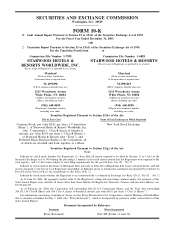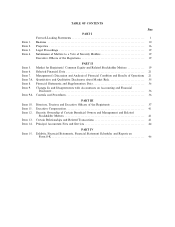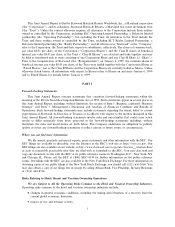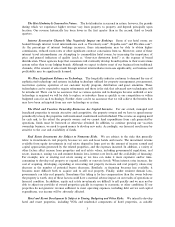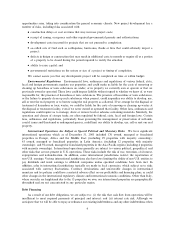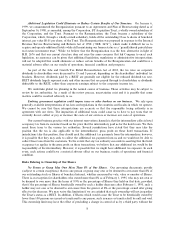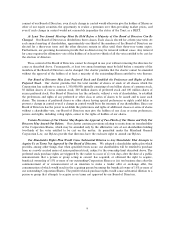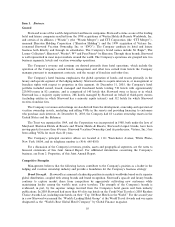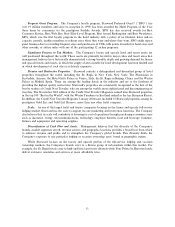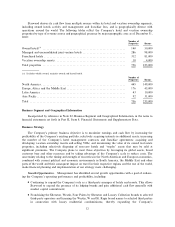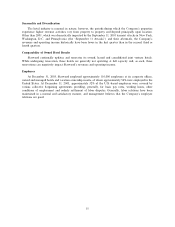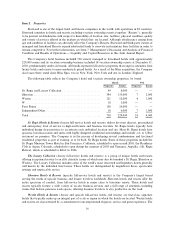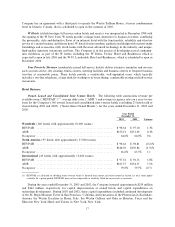Starwood 2003 Annual Report Download - page 17
Download and view the complete annual report
Please find page 17 of the 2003 Starwood annual report below. You can navigate through the pages in the report by either clicking on the pages listed below, or by using the keyword search tool below to find specific information within the annual report.or a determination by a regulatory authority that we were not in compliance, could adversely aÅect us. In
particular, increased regulations of telemarketing activities could adversely impact the marketing of our VOIs.
We bear the risk of defaults under purchaser mortgages on VOIs. If a VOI purchaser defaults on the
mortgage during the early part of the loan amortization period, we will not have recovered the marketing,
selling (other than commissions in certain events), and general and administrative costs associated with such
VOI, and such costs will be incurred again in connection with the resale of the repossessed VOI. Accordingly,
there is no assurance that the sales price will be fully or partially recovered from a defaulting purchaser or, in
the event of such defaults, that our allowance for losses will be adequate.
In 2004, we expect to begin selling fractional ownership interests (which are like VOIs but entitle the
buyer to a longer vacation period, generally three or more weeks, on an annual or alternate year basis) based
on favorable customer response to a fully-refundable reservation program launched in 2003. The sale and
Ñnancing of fractional ownership interests are subject to regulation and default risks similar to those described
above for VOIs.
Certain Interests
Barry S. Sternlicht is the Chairman and Chief Executive OÇcer of the Corporation and the Trust.
Mr. Sternlicht also serves as the President and Chief Executive OÇcer of, and may be deemed to control,
Starwood Capital Group, L.L.C. (""Starwood Capital''), a real estate investment Ñrm. Starwood Capital and
the Company have entered into a non-compete agreement whereby Starwood Capital may not purchase a
hotel property in the United States without the consent of the Company. See Item 13. Certain Relationships
and Related Transactions. Although Starwood Capital is not subject to a non-compete agreement with the
Company for hotel properties outside of the United States, as a matter of practice, all opportunities to
purchase such properties are also Ñrst presented to the Company in accordance with the Company's Corporate
Opportunity Policy. In each case, the Governance Committee of the Board of Directors (or other committee
of independent directors) will make a decision as to whether or not the Company will pursue the opportunity.
In addition, from time to time, the Company has entered into transactions in which Mr. Sternlicht has an
interest. See Item 13. Certain Relationships and Related Transactions. To the extent any executive oÇcer or
director of the Company has an interest in businesses that seek to do business with the Company, any
agreements with those businesses are subject to Governance Committee (or other committee of independent
directors) approval pursuant to the Company's Corporate Opportunity Policy.
Ability to Manage Growth
Our future success and our ability to manage future growth depend in large part upon the eÅorts of our
senior management and our ability to attract and retain key oÇcers and other highly qualiÑed personnel.
Competition for such personnel is intense. There can be no assurance that we will continue to be successful in
attracting and retaining qualiÑed personnel. Accordingly, there can be no assurance that our senior
management will be able to successfully execute and implement our growth and operating strategies.
Tax Risks
Failure of the Trust to Qualify as a REIT Would Increase Our Tax Liability. Qualifying as a real estate
investment trust (a ""REIT'') requires compliance with highly technical and complex tax provisions that
courts and administrative agencies have interpreted only to a limited degree. Due to the complexities of our
ownership, structure and operations, the Trust is more likely than are other REITs to face interpretative issues
for which there are no clear answers. Also, facts and circumstances that we do not control may aÅect the
Trust's ability to qualify as a REIT. The Trust believes that since the taxable year ended December 31, 1995,
it has qualiÑed as a REIT under the Internal Revenue Code of 1986, as amended. The Trust intends to
continue to operate so it qualiÑes as a REIT. However, the Trust cannot assure you that it will continue to
qualify as a REIT. If the Trust fails to qualify as a REIT for any prior tax year, the Trust would be liable to
pay a signiÑcant amount of taxes for those years. Similarly, if the Trust fails to qualify as a REIT in the future,
our liability for taxes would increase.
7




